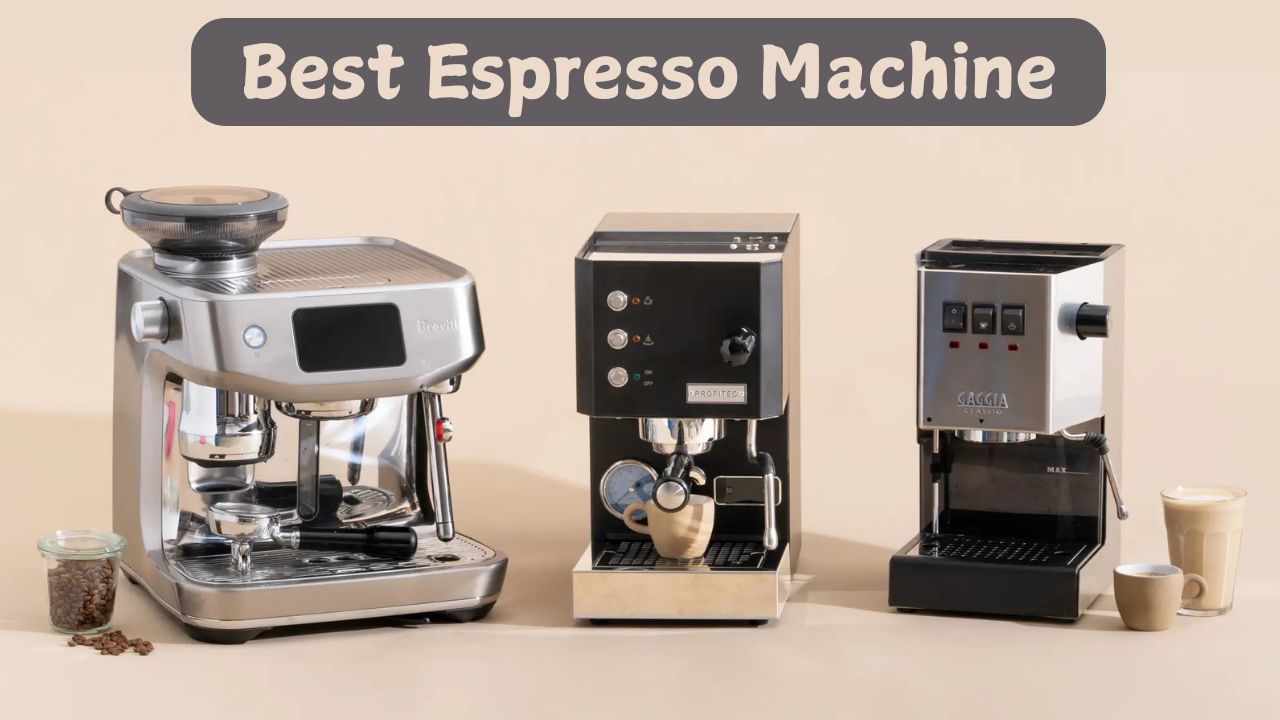Written By: Sherry Harris
If you’re a coffee lover, having a quality espresso machine at home can be a game-changer. Whether you crave a rich shot of espresso or a creamy cappuccino, the right machine makes all the difference. With so many options available, choosing the best espresso machine can be overwhelming. This guide will help you understand the different types, key features, and best models to suit your needs.
Table of Contents
Types of Espresso Machines
Different espresso machines offer varying levels of control and automation. Some require manual effort, while others automate the entire brewing process. Understanding these types helps users choose a machine that fits their skill level and lifestyle.
Manual Machines
Manual best espresso machines require users to grind, tamp, and pull shots manually. These machines offer full control over the brewing process, allowing for customized flavors. However, they require skill and practice to master. They are ideal for coffee enthusiasts who enjoy hands-on brewing.
Pros:
- Users can fine-tune every aspect of espresso-making.
- Capable of producing high-quality espresso with proper technique.
Cons:
- Requires significant time and practice to master.
- More effort is needed compared to automatic machines.
Semi-Automatic Machines
These machines automate some steps, such as temperature and pressure regulation, but still require manual grinding and tamping. They offer a balance between convenience and control. Semi-automatic machines are perfect for those who want a hands-on experience without excessive effort.
Best Models:
- Breville Barista Express: Known for its built-in grinder and ease of use.
- Gaggia Classic Pro: A budget-friendly machine with professional features.
Fully Automatic Machines
Fully automatic machines control water flow and shot timing, making espresso-making effortless. Users only need to press a button, and the machine takes care of the rest. They are great for those who want consistency without much manual effort.
Popular Models:
- De’Longhi Magnifica: A reliable and affordable fully automatic machine.
- Philips 3200 Series: Features advanced brewing technology and ease of use.
Super-Automatic Machines
These machines handle everything from grinding to frothing milk with a single button press. They are designed for convenience and consistency but offer less control over the brewing process. Super-automatic machines are ideal for busy individuals who want high-quality espresso quickly.
Top Picks:
- Jura E8: Known for its premium design and advanced technology.
- Saeco Xelsis: Offers multiple drink customization options.
Pod or Capsule Machines
Pod machines use pre-packaged coffee pods for quick and hassle-free brewing. They are best suited for those who value convenience over customization. While they produce consistent espresso, the flavor quality may not match freshly ground coffee.
Top Brands:
- Nespresso VertuoPlus: A popular choice for its ease of use and variety of pods.
- Keurig K-Cafe: Offers espresso-style coffee along with regular coffee options.
Top 5 Best Espresso Machines in 2025
Each machine in this list is chosen based on performance, ease of use, and customer reviews.
1. Breville Barista Express
The Breville Barista Express is a top choice for home baristas who want control over their espresso without breaking the bank. It features a built-in conical burr grinder, allowing users to grind fresh beans for optimal flavor. The semi-automatic operation provides a balance between manual control and automation, making it suitable for both beginners and experienced users.
2. Jura E8
The Jura E8 is a premium super-automatic best espresso machine known for its high-end features and ease of use. It grinds, tamps, brews, and froths milk at the push of a button, delivering café-quality drinks with minimal effort. The machine features Jura’s Pulse Extraction Process (P.E.P.), which enhances coffee flavor and aroma.
3. Gaggia Classic Pro
The Gaggia Classic Pro is a popular semi-automatic espresso machine that offers a professional-grade espresso experience at an affordable price. It features a commercial-style 58mm portafilter and a powerful steam wand for high-quality milk frothing. This machine is ideal for those who want to experiment with grind size, tamping pressure, and extraction time.
4. Nespresso VertuoPlus
For those who prioritize convenience, the Nespresso VertuoPlus is an excellent choice. This pod-based espresso machine uses Nespresso’s Centrifusion technology, spilling the capsule at high speed to extract a rich, crema-topped espresso. It offers multiple cup sizes, making it versatile for both espresso and coffee lovers.
5. De’Longhi Magnifica
The De’Longhi Magnifica is a budget-friendly fully automatic espresso machine that delivers great value for money. It includes a built-in grinder, allowing users to brew fresh espresso without needing a separate grinder. The customizable settings let users adjust the strength, volume, and temperature of their coffee. With its compact design and user-friendly interface, it’s a great entry-level choice for those looking to enjoy espresso at home without spending a fortune.
| Espresso Machine | Type | Key Features | Best For |
|---|---|---|---|
| Breville Barista | Semi-Automatic | Built-in grinder, precise temperature control | Home baristas |
| Jura E8 | Super-Automatic | Multiple drink options, Pulse Extraction Process | Premium coffee lovers |
| Gaggia Classic Pro | Semi-Automatic | Commercial-style portafilter, powerful steam wand | Espresso enthusiasts |
| N-VertuoPlus | Pod Machine | Centrifusion technology, one-touch brewing | Convenience seekers |
| De’Longhi Magnifica | Fully Automatic | Built-in grinder, adjustable settings | Beginners |
Do You Know?
Key Features to Look for in Machine
Choosing the best espresso machine involves considering essential features. The right features improve convenience, efficiency, and espresso quality.
Pump Type
A good espresso machine should provide at least 9 bars of pressure for optimal extraction. Higher-end models often feature 15-bar pumps for a richer and more consistent espresso shot. A high-pressure system ensures that water passes through the coffee grounds efficiently, extracting flavors evenly.
Boiler Type
- Single Boiler: Best for home use but requires waiting between brewing and steaming. These machines are slower but more affordable.
- Dual Boiler: Allows simultaneous brewing and steaming, making it ideal for making multiple drinks quickly. Dual boilers are often found in commercial-grade machines.
Grinders
Machines with built-in grinders offer convenience by ensuring fresh grounds with every shot. However, a separate grinder provides better control over grind size, allowing users to adjust based on bean type and roast level. Investing in a high-quality burr grinder is recommended for the best espresso flavor.
Milk Frothing System
A good milk frothing system is essential for making lattes and cappuccinos. Some machines have manual steam wands, allowing users to control the texture of the foam. Others feature automatic frothing, which is ideal for beginners who want consistent milk-based drinks.
Ease of Cleaning
Espresso machines require regular cleaning to maintain performance. Some models have self-cleaning functions that remove coffee residue automatically. Machines with removable components make it easier to clean and maintain hygiene.
Best Espresso Machine as Uses Base
Beginners use
Beginners should look for a machine that is easy to use and requires minimal effort. Semi-automatic and pod machines are ideal choices. The Breville Bambino Plus and Nespresso VertuoPlus offer simple operation without compromising espresso quality.
Home use
Home users need a balance between quality, convenience, and affordability. The Breville Barista Express is a great option, offering a built-in grinder and excellent brewing performance. It provides a semi-automatic experience with just the right amount of manual control.
Commercial use
For coffee shops or businesses, commercial-grade machines with high durability and consistency are essential. The La Marzocco Linea Mini is a top choice, offering professional-level performance in a compact design. It features dual boilers and precise temperature control, making it ideal for high-volume use.
Budget vs. Espresso Machines
Budget espresso machines provide basic functionality and are great for beginners. They may lack advanced features like dual boilers and built-in grinders. Premium machines, on the other hand, offer better build quality, advanced customization, and superior consistency. While budget machines can make good espresso, premium models enhance the experience with more precise control.
Conclusion
Choosing the best espresso machine depends on your preferences, budget, and desired level of control. Whether you want a fully automatic model for convenience or a semi-automatic machine for hands-on brewing, there are plenty of options available in 2025. Features like built-in grinders, customizable settings, and high-quality steam wands can enhance your coffee experience at home.
Investing in the best espresso machine allows you to enjoy barista-level coffee without frequent trips to a café. By considering factors such as ease of use, durability, and coffee quality, you can find the perfect machine to suit your lifestyle. No matter which model you choose, a great best espresso machine will elevate your daily coffee routine.
Frequently Asked Question
Q. What is the ideal pressure for an espresso machine?
The ideal pressure for an espresso machine is around 9 bars. This pressure is enough to force hot water through the coffee grounds at the right speed, extracting the perfect balance of flavors. Some high-end machines allow users to adjust the pressure, but 9 bars remain the industry standard.
Q. How often should I clean my espresso machine?
Regular cleaning is essential to maintain the performance and longevity of your espresso machine. It’s best to rinse the group head and portafilter after every use to prevent coffee residue buildup. A deeper cleaning, including descaling, should be done at least once a month to remove mineral deposits.
Q. Can I use regular coffee beans for an espresso machine?
Yes, you can use regular coffee beans, but espresso-specific beans deliver the best results. Espresso beans are typically roasted darker to produce a rich, bold flavor when brewed under high pressure. Regular coffee beans, especially light roasts, may produce a sour or acidic taste when used for espresso.
Q. How long do espresso machines last?
A well-maintained espresso machine can last 5 to 15 years, depending on the brand, usage, and maintenance. High-end models with durable components and proper care tend to last longer. Regular descaling, cleaning, and replacing worn-out parts can significantly extend the machine’s lifespan.
Q. What is a semi-automatic vs fully automatic espresso machine?
A semi-automatic espresso machine gives the user more control over the brewing process, requiring manual operation to start and stop extraction. This allows customization of shot timing and strength.
In contrast, a fully automatic espresso machine handles the entire process at the push of a button, making it more convenient for those who want a consistent espresso with minimal effort. Both have their advantages, depending on user preference.

